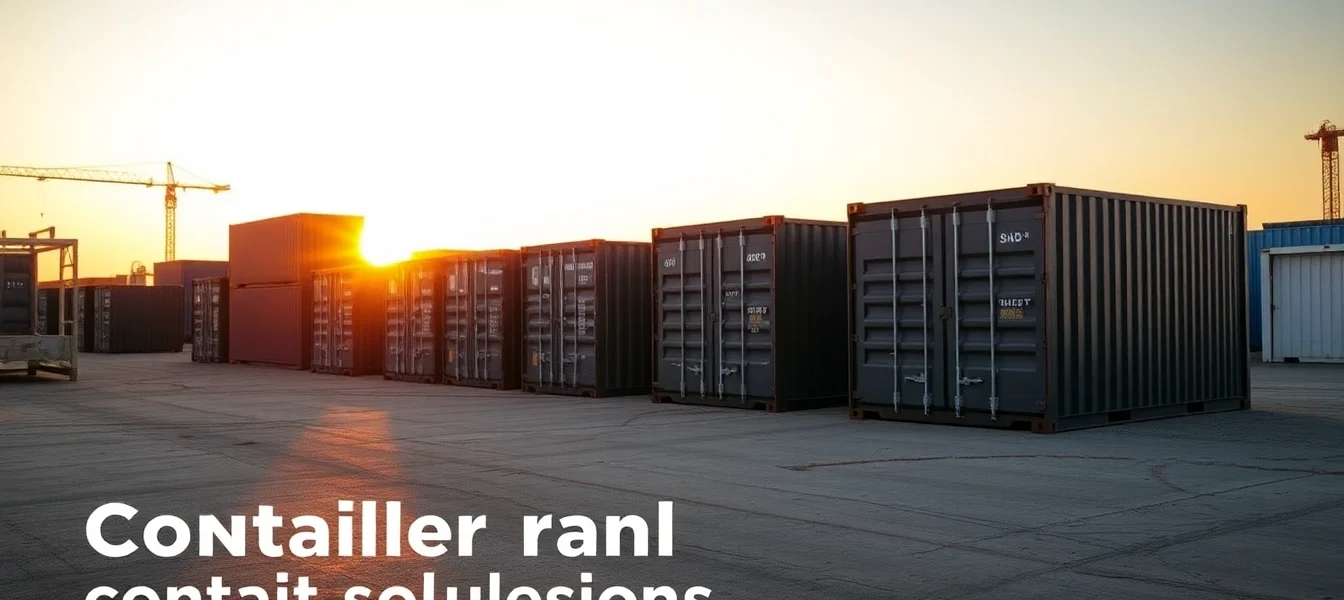Comprehensive Guide to Container Rental Solutions in the UK for Businesses and Projects
Understanding Container Rental: Types and Applications
Container rental has become an indispensable solution across multiple industries in the UK, offering flexible and efficient options for storage, transportation, and on-site accommodation. As businesses and project managers seek cost-effective and scalable solutions, understanding the nuances of different container types and their applications is essential. Whether you manage a construction site, run an event, or require extra storage capacity, knowing how to select the right container rental service can significantly impact your operational efficiency and bottom line.
For those exploring options, it is advisable to start with comprehensive research — a natural step is to explore the Container rental market, which offers a wide array of choices tailored to specific needs. From standard shipping containers to specialized units, the diversity and versatility of rental options in the UK ensure that most project requirements are met with minimal hassle.
Different types of shipping containers available for rent
Shipping containers have evolved from simple transport units into highly adaptable storage solutions. The main types of containers available for rent in the UK include:
- Standard Dry Containers: The most common type, typically measuring 20ft or 40ft, designed for general storage and transportation of non-perishable goods. These containers are robust, weather-tight, and ideal for both short-term and long-term rental applications.
- Reefer Containers (Refrigerated Containers): Equipped with cooling units to transport perishable commodities, reefer containers are essential for food, pharmaceuticals, and botanical products. They require specialized handling and are rented primarily for specific supply chain needs.
- Open-Top Containers: Featuring a removable top, these are perfect for bulky or over-height cargo, such as machinery or large equipment, that cannot easily be loaded through standard doors.
- Flat-Rack Containers: Designed for heavy or oversized cargo, offering collapsible sides for flexible loading and unloading options.
- Tank Containers: Used mainly for liquids or chemicals, these containers meet strict safety standards and are often rented by industrial clients.
In addition to these, there are specialized units such as storage pods, mobile containers, and bespoke conversions, allowing customization based on project-specific requirements.
Popular uses of container rentals in construction and event management
Container rentals play a pivotal role in supporting large-scale construction projects. They serve as secure storage for tools, materials, and machinery, reducing theft and damage while ensuring easy access on-site. For example, many construction firms rent robust steel containers to securely store expensive equipment overnight or during weekends, enhancing operational security and efficiency.
In the realm of event management, portable containers facilitate quick deployment of infrastructure and storage. For music festivals, fairs, and sporting events, containers can be converted into ticket booths, VIP lounges, or restrooms. Their mobility and scalability make them ideal for temporary setups, allowing organizers to adapt quickly to changing requirements.
Moreover, containerized solutions are increasingly used for on-site offices, emergency shelters, or sanitary facilities in remote or disaster-affected areas. Their mobility, durability, and ease of installation ensure rapid deployment in critical situations, demonstrating their versatility beyond traditional storage applications.
Advantages of renting over buying storage containers
Opting for container rental instead of purchasing offers significant advantages that align with modern project needs:
- Cost-Effectiveness: Rental costs are generally lower than upfront purchase prices, especially for short-to-medium term projects. This approach preserves capital for other investment areas and reduces financial risk.
- Flexibility and Scalability: Rental agreements can be tailored to specific durations, allowing businesses to scale up or down as project scope evolves without the burden of owning and maintaining unused units.
- Maintenance and Repairs: Reputable rental providers include maintenance as part of their service, ensuring containers remain in optimal condition without additional costs or effort from the renter.
- Latest Technologies and Standards: Renting allows access to newer models with advanced security, insulation, and customization features, which might be costly to purchase outright.
- Reduced Storage and Disposal Concerns: For temporary needs, renting eliminates the long-term commitment associated with storage and disposal, simplifying logistics management.
Overall, container rental aligns with just-in-time inventory principles, allowing organizations to adapt quickly while maintaining operational agility.
How to Choose the Right Container Rental Service
Key factors: size, duration, and security features
Selecting the appropriate container rental service hinges on several critical factors:
- Size: Determine the volume of storage required. Standard sizes like 20ft or 40ft containers are common, but custom sizes are available for specialized needs. Accurate measurement prevents overpaying for unnecessary space or underestimating storage needs.
- Rental Duration: Whether you need a container for a few weeks or several months influences pricing and contractual terms. Some providers offer flexible rental periods with options for extension or early termination.
- Security Features: Look for containers equipped with robust locking mechanisms, security seals, and options like CCTV surveillance. For high-value or sensitive items, containers with reinforced locks and construction are recommended.
Understanding these factors enables tailored solutions that optimize operational efficiency and cost management.
Evaluating rental providers: reliability and delivery options
Choosing a reliable rental provider is paramount to ensure timely delivery, quality assurance, and ongoing support. Key aspects include:
- Reputation and Customer Reviews: Research provider track records through reviews and testimonials. Look for consistency in service quality and responsiveness.
- Delivery and Collection Options: Confirm the provider’s ability to deliver containers to your site location, especially in remote or challenging terrains. Check for flexible scheduling and whether the provider handles the logistics seamlessly.
- Availability and Inventory: Ensure the provider maintains an adequate stock of containers in various sizes and types, preventing delays due to unavailability.
- Support Services: Evaluate customer support, including technical assistance, maintenance, and dispute resolution.
In the UK context, providers such as Willbox and others are renowned for their nationwide coverage and reliable services.
Cost considerations and rental pricing strategies
Cost is often a decisive factor when selecting a rental service. Understand the components of rental pricing:
- Daily or Weekly Rates: Rates vary based on container size, type, and rental duration. Long-term rentals often benefit from discounted rates.
- Delivery and Collection Fees: Transportation costs can significantly influence overall expenditure, especially for remote sites.
- Security and Customization Charges: Additional features such as security seals, climate control, or customized modifications may incur extra costs.
- Return Policies and Hidden Fees: Clarify conditions regarding container damages, late returns, or additional service charges to avoid unforeseen expenses.
Pricing strategies should focus on total cost of ownership and alignment with project budgets. Negotiating package deals or long-term contracts may yield better value.
Best Practices for Effective Container Rental Management
Customization and accessory options for containers
Modern containers can be customized with various accessories to enhance functionality and security:
- Shelving and Racks: Improve organization within storage units.
- Insulation and Ventilation: Critical for food storage or climate-sensitive items.
- Electrical Fittings: For lighting, power, or climate control systems.
- Doors and Windows: For ease of access and natural light, especially in converted units.
- Security Enhancements: Additional locks, alarm systems, or CCTV integration.
Engaging with the rental provider early ensures these customizations are seamlessly integrated, and additional costs are predictable.
Maintaining security during storage and transportation
Security remains a top priority—both for protecting contents and complying with legal standards. Best practices include:
- Using high-quality padlocks and lockboxes that resist tampering and cutting.
- Implementing CCTV monitoring where feasible, especially for long-term storage sites.
- Secure anchoring and foundation setups to prevent containers from shifting or tipping during transit or storage.
- Regular inspections to identify and address vulnerabilities promptly.
- Implementing access controls and documentation to track personnel entering or exiting secure areas.
Partnering with providers that offer robust security features and support ensures peace of mind and compliance.
Handling logistics and scheduling for timely delivery
Effective logistics management minimizes downtime and optimizes operational flow:
- Establish clear communication channels with the rental provider.
- Schedule deliveries during off-peak hours to avoid congestion.
- Plan for contingencies, such as weather delays or road restrictions.
- Coordinate with site managers to ensure proper space and access points are prepared.
- Utilize real-time tracking tools if available, to monitor container movements.
Implementing these practices ensures containers arrive on time, reducing project delays and additional costs.
Maximizing ROI with Container Rental in the UK
Strategies to optimize rental periods and costs
Maximizing return on investment involves strategic planning around rental periods:
- Long-term rentals: Generally offer reduced rates and greater flexibility, suitable for ongoing projects or continuous storage needs.
- Bundle services: Combining delivery, maintenance, and customization into a single package can lead to discounts.
- Scheduling pickups and returns: Accurate planning prevents extended rentals due to delays or miscommunication.
- Regular assessment: Periodically evaluate whether the container still meets your requirements to avoid unnecessary costs.
Case studies indicate that early planning and negotiated long-term agreements can reduce costs by up to 20%, significantly boosting project profitability.
Case studies of successful container rental projects
In the UK, numerous organizations exemplify effective container rental strategies:
Construction Sector: A Major Housing Development
A leading construction firm utilized 40ft containers as onsite storage units, reducing theft and damage by 30%. By establishing a long-term rental agreement with a trusted provider, the company saved 15% annually on storage costs and improved project timelines.

